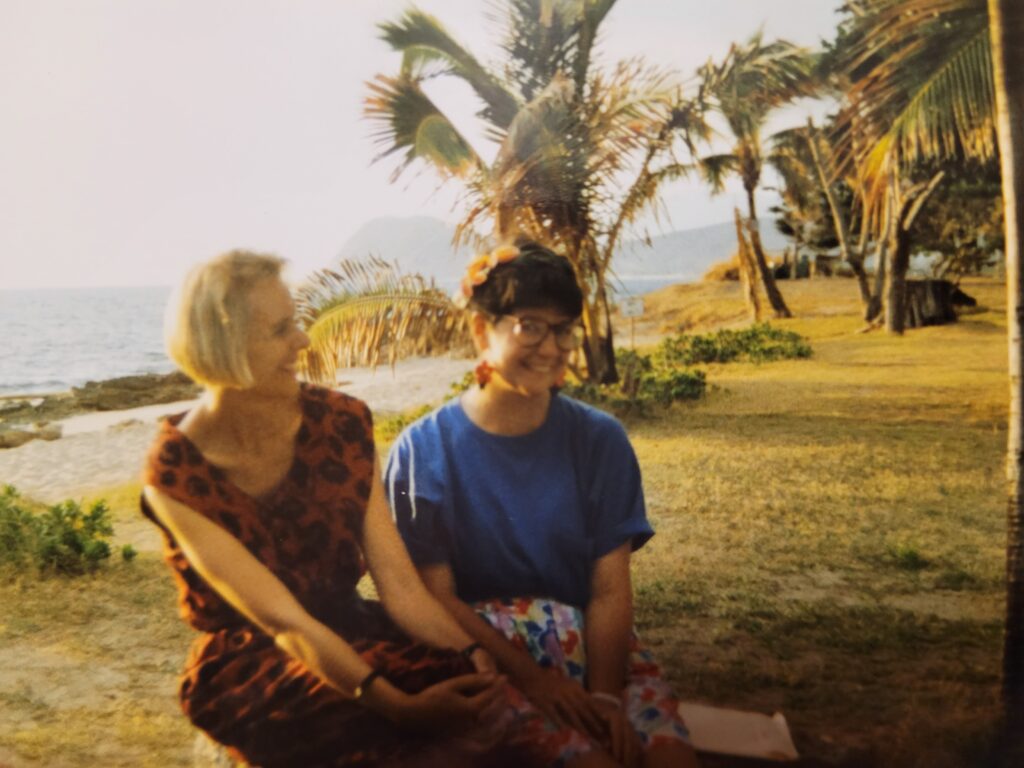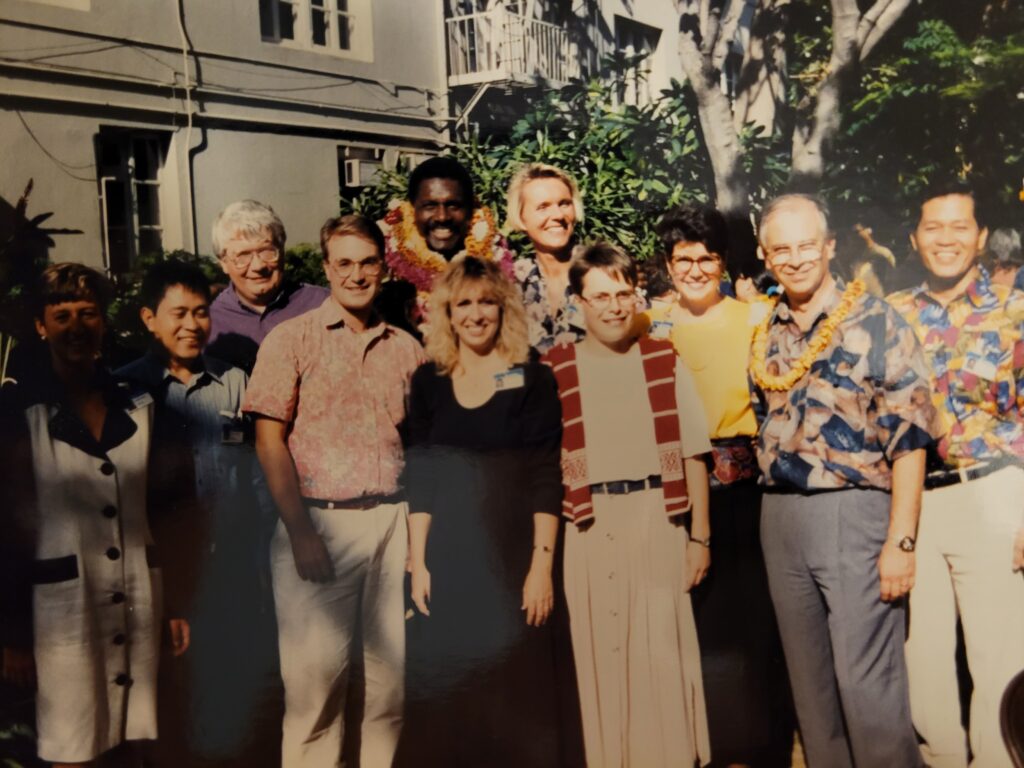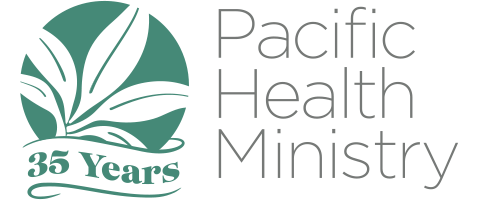“I have often said that CPE is the most important thing I have ever done in my life.”
-Peggy Sanderford Ponder
Why did you enroll in CPE?
I thought CPE would be a good thing for me. I was a trained minister and unemployed at the time and was having trouble finding a job. A friend encouraged me to do CPE and said I would be great as a chaplain because I related well to people whose thinking differed. And so, I thought it would be an excellent next step in training for ministry.
How did you initially hear about the CPE program through PHM?
I decided that if I was going to do CPE, I wanted to go somewhere I’d never been before. There was a red book and, as I was looking through it, I realized that the program at PHM had what I wanted: a variety of experiences and a variety of locations to do it, so it fit my bill. When I started exploring more, it seemed like I was the kind of person they were looking for. It was lovely and a great connection.
Did you have any preconceived notions about CPE?
I thought CPE would be really, really hard, but it was difficult in a way I never expected. You know, other things in my life had been challenging, but this was hard–in a very different way. CPE required me to look at myself, be introspective, and consider how I related to others. I had to look at how I understood things, who I was, and what I carried into a room, which impacted my encounters with the people I was visiting or trying to minister to.
CPE was hard and I don’t want to take away from that, but the program was structured in an action-reflection model that fit my belief and method of learning.
What program did you participate in?
I did my unit in the summer of 1993 at Kapiʻolani Medical Center for Women and Children. Anke Flohr and I actually did CPE together. Immediately afterward, I started a residency at Queen’s Medical Center. After I finished my residency and got my job, I went back to Honolulu several months later and was ordained by First Baptist Honolulu on April 2nd 1995. Anke was part of my ordination ceremony.

What was the CPE program like?
I did my summer unit at Kapiʻolani, and I lived about a block away which was lovely. I remember Gail Sugimoto was working there. There was another CPE student there with me that summer, and sometimes he and I would interact about our encounters and talk with Gail about them. Then we met with the rest of the group and did didactics and case presentations.
I also remember going over, visiting folks, and encountering women having trouble with pregnancy. That never occurred to me before because I hadn’t known anybody who went through that.
One of the first women I met in the hospital was somebody from Alabama who had gone to high school with a friend that I knew from college. It was just bizarre. There I was in Hawaii, and I had this odd connection. It reminds me that we never know who we are going to run into and how we are going to impact them and how they are going to affect us. It was the oddest thing because it was so early into my time there.
One of the first case presentations of my residency was with a dying woman. She was trying to understand what death meant to her. She had never really had anybody to talk with about it. I got to walk with her through what the afterlife meant to her. It was a difficult encounter then and lovely because hopefully, she thought about what it meant to her. It certainly made me consider what I believed about it because I never had a conversation with anybody as meaningful about death. As she was doing her work and I was helping, I was also doing a lot of internal work.

How has CPE affected you professionally?
It was cool because Kapiʻolani was a women’s and children’s hospital, and I never thought that would be of interest to me, yet I learned a whole lot. I am currently a pediatric chaplain, so it was nice to experience it. I would not be who I am today without CPE. It opened me up personally and exposed me to lots of things.
I am currently a board-certified chaplain and work at Children’s of Alabama; CPE definitely impacted that. After I finished CPE, I was a hospital chaplain for a while, and then I worked in a local parish. From that time in the church, I realized that I was much more interested in the kind of work I could do in a hospital. I then started to do chaplaincy again and further training as a pastoral counselor. The CPE program prepared me for that pastoral counseling training. Currently, I’m a Pastoral Psychotherapist and a Licensed Marriage and Family Therapist. I have two different jobs, and I couldn’t be doing either one of them without the impact of CPE.
How had CPE affected you personally?
CPE was all about introspection and about helping me understand, on a deeper level, what I believed and how that impacted me. I had to figure out what I carried into those encounters and how to avoid letting that get in the way of helping others. I have often said that CPE is the most important thing I have ever done in my life. My husband does not appreciate that because he wants marrying him to be the most important thing. However, I was prepared to marry him because of CPE. That’s my story, and I’m sticking with it.
CPE was the most impactful thing I’ve done in my life. It came at a great time in my life. I was there when I needed to be there, and I learned a whole lot. It was not easy learning, and there was resistance all over the place, but it was really important for me.
I would tell an incoming CPE student to relax into the experience and realize that this is an opportunity for you to become a better person and a better minister. If you go in with lots of barriers built up, it will not be as impactful for you. Realize that people are there to help you. It took me a while to figure that out, and I wish it hadn’t. People were with me on the journey; we’d all chosen to be there. That’s part of what made the experience so meaningful.
Life during Covid?
I’ve been pretty much inside during COVID. I’m in Birmingham, Alabama, and it is 34 degrees here, so I don’t want to get out now, but I tried to be outside more during the beginning of COVID. Professionally, we have had more cases than we’ve ever seen because they are all over the hospital.
I’ve also watched so many shows! We’ve been at this for almost two years, so I’ve watched a lot of TV, especially Schitt’s Creek.
